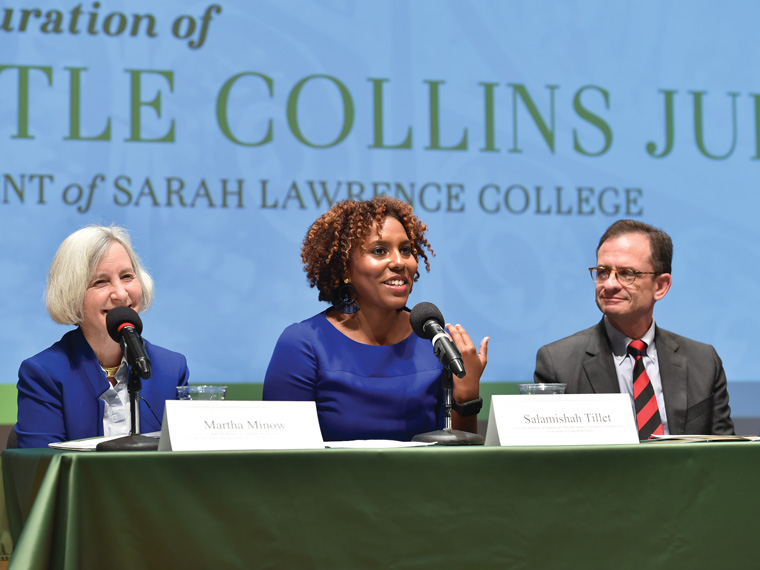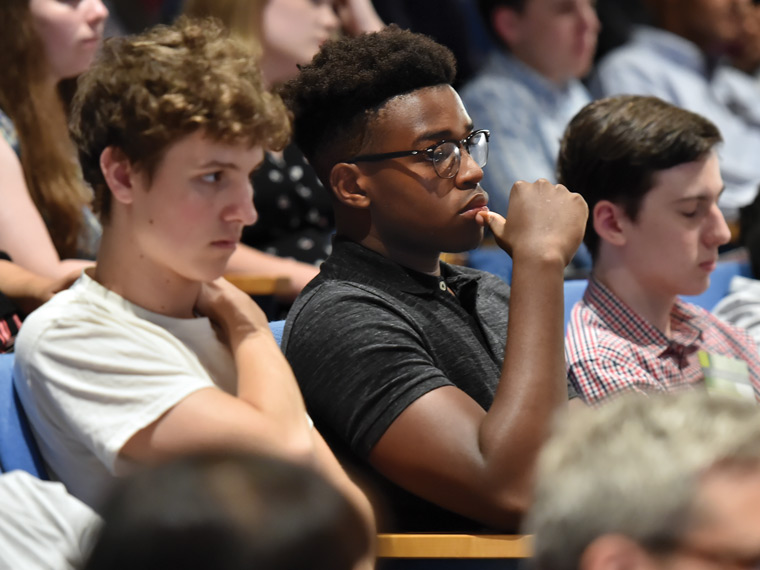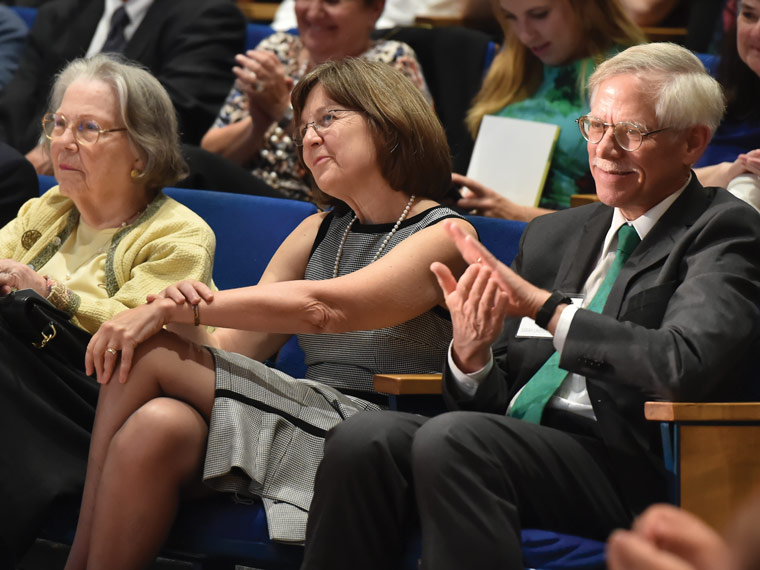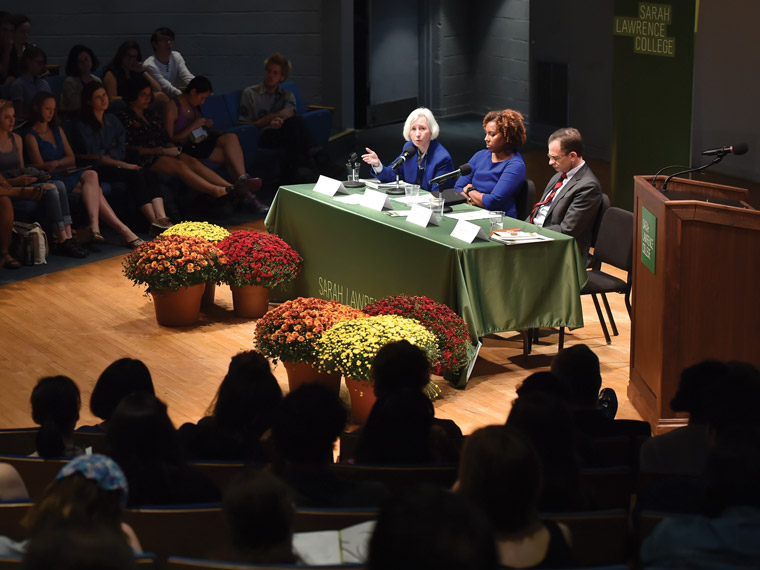In the inaugural symposium last fall, panelists, students, staff, and professors tackled this question and its inverse: Is democracy essential to education?
Gregg M. Horowitz ’80, Sarah Lawrence Trustee: It is generally acknowledged that an educated citizenry is essential to a well-functioning democracy. But what contribution does democracy make to education?
Martha Minow, Carter Professor of General Jurisprudence, Harvard Law School: The founders of the United States understood that “an ignorant people cannot remain a free people and that democracy cannot survive too much ignorance.” The creation of schools was a project embraced by the states, and it remains an ongoing constitutional commitment across the United States, although it is one fraught with unequal resources and ongoing exclusions. The people in today’s United States believe with John Dewey that schools should, and I quote him, “see to it that each individual gets an opportunity to escape from the limitations of the social group in which he was born and to come into living contact with a broader environment.” Such a great ideal—that what school offers is the chance to have other worlds besides the one that you’re thrown into by accident of birth.
Salamishah Tillet, Associate Professor of English and Africana Studies, University of Pennsylvania: I first read John Dewey’s 1916 classic Democracy and Education: An Introduction to the Philosophy of Education during the summer of my sophomore year at the University of Pennsylvania, around 1993. While we spent our weekdays developing and implementing a curriculum for sixth graders that included gardening, health sciences, and cooking, our evenings were spent in a seminar … waxing philosophical about Dewey’s ideas … and the relationship between the university as a place of higher education and community engagement. We asked each other: “What was the responsibility of our Ivy League school to our mainly working- and middle-class African American neighbors of West Philadelphia? What knowledge could we students share with children at Turner Middle School? What could we learn from them?” Those early conversations … really imprinted me. I began to see universities as both “laboratories”—to pull from another Dewey idea—at which we should deeply engage topics like race, gentrification, gender, and social justice, and as extensions of the very communities in which we reside.
Daniel Weiss, CEO, Metropolitan Museum of Art: Progress is not inevitable. … Educational leaders must be courageous and visionary, be willing to say things that are going to be controversial. Advocacy is important; it’s not about being partisan. If we can do those things well, then we can continue to feed our democracy in fundamental ways. And if we don’t, all bets are off.
Alsan Diouf ’21: I’m a first-year. [Regarding] students at liberal colleges or universities who have protested conservative speakers coming to their campus, how do we as a community make space for ideas that we don’t want to hear? Is there anything that shouldn’t be said, ever, in terms of hate speech, or should it all be protected? [Applause]
Weiss: … I think it’s really important for us as educators to establish ground rules around what the educational enterprise supports. So there are boundaries around speech that is hateful, that creates dangerous situations, that undermines the integrity of the enterprise. There is a line.
Minow: While I am a huge advocate of free speech, there’s not a single social movement in this country that has ever succeeded without actually challenging regulation of speech and expanding the boundaries. Whether it’s racial justice, women’s rights, the LGBT movement, the union movement, or right-wing movements—none of them are possible without free speech. At the same time, let’s be clear: You can be a vibrant democracy and have more regulation of hate speech than we have right now. It is not inconsistent with democracy to have limits on hate speech. [But] you can’t actually have a conversation unless you have some basic conditions for conversation. If there’s so much noise or disruption or threat or a sense of insecurity or violence, it’s just not possible.
Mina Erten ’21: I’m not an American citizen. In fact, I’m half Turkish—so the dictatorship part of democracy—and half Swiss—so the arguably perfect democracy—and I came to Sarah Lawrence from Catalonia, the revolutionizing or under-fire democracy of the moment. This is my question: What is community when it comes to democracy? Why do we go over community values when, in a society which is somewhat ill-educated, the bias of groups or communities dictates individual opinions so often? [Applause]
Weiss: Let me just say from the outset, these are the best questions ever. [Applause] The premise of a liberal arts college is that if you can build a strong community, people can be vulnerable, and they can learn from each other, and they can have a context for disagreement that is a microcosm of the world. That if you can do that well at Sarah Lawrence College for four years, and you know how to do that and how to disagree and how to love people you don’t agree with and how to rely on one another, then ideally you take that out into the world. Community is a fundamental component of what effective learning can be. People didn’t all just move here because it’s near the bus stop. They moved here because they want to be part of this place.
Tillet: My instinct is a different answer. [There] is the idea of intentional community, and then there are communities or identities that are imposed on you. One way in which you resist the stigma attached—like being African American or being queer—actually, is creating a community around that [identity]. I think your question, though, is about the way in which individual needs, desires, and identities can be sublimated or suppressed by the group or groupthink. We’re in a moment right now in which we’re really trying to battle what that means.
Minow: What do you do in community? You recognize that there are other people besides yourself. You manage to govern your emotions when you’re bored or you don’t like what other people are saying or doing. You maybe even come to understand that you could support things that you didn’t think you could, because you have connections with people and understand what [those things] mean to them.
Katherine McQuade ’21: I am a first-year student. In this institution, there is a huge divide in terms of wealth. When it comes to daily interactions between members of the wealthy class and members of the working class, there is often tension, misunderstanding, and lack of awareness. How do we as a society overcome these class tensions to better understand one another and create a productive, compassionate society?
Minow: I think of all of the difficult conversations that we need to have in this country, class is the one that people find hardest to talk about. We are living in a time when inequality has grown faster than almost anything else, and we don’t have a vocabulary to talk about that. We need to work on that.
Weiss: You’re a first-year student. So my last comment will be, I hope, an uplifting one. One of the fundamental goals of this kind of educational model is to give people greater awareness of what the power of empathy can create. Hopefully in every class you take these issues will come up, and … by the time you graduate, you’ll be with classmates in a community where those issues are not front and foremost for you. That’s one of the fundamental goals of the education you’re here to get.
Condensed and Edited by Katharine Reece MFA ’12
Photos by Dana Maxson




